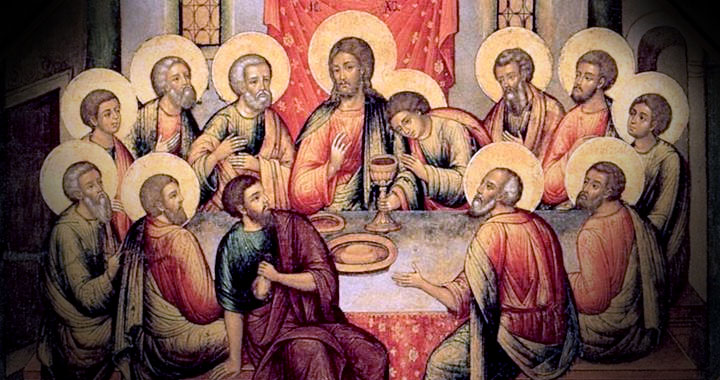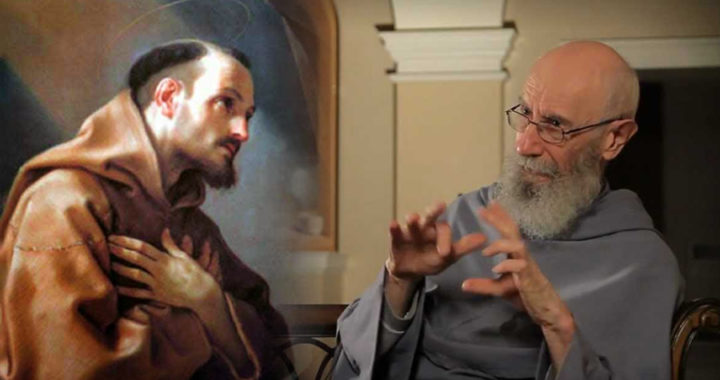Since the Holy Eucharist plays a central salvific role in Christian life, we must begin our study of the Eucharist's importance with an examination of the event that first doomed all of mankind—the fall of Adam (Genesis 3).
What God Desired
In brief: God wanted Adam (man created in perfect justice, entirely free from sin), to learn true loving obedience. When Eve was tempted by Satan in the Garden, God wanted Adam to sacrifice himself for the sake of his bride. In offering this faultless, loving, obedient, and selfless sacrifice, Adam would secure the prize of everlasting life with God.
We can surmise from Jewish tradition that God desired Adam to at least be willing to offer himself as a sacrifice for the sake of his bride. The Rabbis consider Genesis 3 to be of a sort of riddle-genre that requires careful interpretation. In this regard, we should reflect on these two exegetical insights:
- It must be recognized that in the Genesis account Adam was portrayed as a priest because God commanded him to "till and keep" the Garden of Eden. This language—"till and keep”—is only ever used to describe the role of priests (Numbers 3:7-8, and 8:26). And the main function of a priest is to offer sacrifice—so the riddle seems to be, "What sacrifice is this priestly Adam called to offer?" To answer this question, we should reflect on 1 Samuel 15:22: "Does the Lord delight in burnt offerings and sacrifices as much as in obeying the Lord? To obey is better than sacrifice, and to heed is better than the fat of rams." The Lord desired Adam to remain obedient to his duties to till and keep the garden and to not allow the fruit of the forbidden tree to be eaten, no matter the cost.
- The term nahash (translated as "serpent" in Genesis 3) is more accurately translated as "dragon"—the same dragon seen in Revelation 12: "The great dragon was thrown down, that ancient serpent, who is called the Devil and Satan, the deceiver of the whole world—he was thrown down to the earth, and his angels were thrown down with him." Our understanding of what type of beast confronted Adam and Eve in the Garden needs to take Revelation 12 into account. The dragon St. Michael defeated marched into the garden, not some small slithery snake. It is of some importance that a popular ancient Rabbinic interpretation of Genesis 3 may be paraphrased as follows: Satan saw Adam and Eve engaging in sexual intercourse, and Satan, lusting after Eve, intended at the very least to kill Adam so he could keep Eve for himself (Bereishit Rabbah 18:6). It was also a popular Rabbinic teaching that Eve was forcefully manhandled by Satan when he tempted her: "he grabbed her and pushed her against the tree. 'So, have you died?' he asked her. 'Just as you were not stricken when you touched it, so will you not die when you eat from it.'" (Bereishit Rabbah 19:1). These interpretations are not divinely inspired—they are basically famous Jewish homilies—but they can be very useful in seeing how the Jewish tradition viewed the riddle of Genesis 3. Taken altogether, the dragon in the Garden is perhaps best understood as a menacing and aggressive figure, who convinced Adam and Eve to sin by his threatening stature.
In this context, it can be concluded that God desired Adam to stand up to the dragon, willing to offer up his own life for the sake of true loving obedience to the Lord and for the sake of his wife’s safety.
What Happened
Adam failed—he allowed his bride to be seduced by Satan and he gave into the devil’s lies as well. Adam and Eve ate from the Tree of Knowledge of Good and Evil in an attempt to become gods.
- The Consequences: Adam and Eve became spiritually dead. And because they were spiritually dead, their offspring (all of humanity) would be born in the same condition. Thereafter: No human is born knowing God personally; no human experiences perfect harmony with nature; no human dies naturally in God’s friendship (Rom 5:10); all humans experience the weakness and disorder of mind, body, and spirit brought on by sin; all humans are born sinners.
- Remaining Conditions (Hope for humanity’s atonement): After the failure of Adam, the conditions necessary for obtaining everlasting life with God remain. In order to live forever with the Father, a human must be perfectly sinless and must make an unstained offering of him/herself in obedience to God’s will.
- The Problem: Because of Adam’s sin, no human being is perfectly sinless, so the conditions for everlasting life are impossible for ordinary humans to attain.
As you may have guessed, the solution to the problem requires an extraordinary human, one who is perfect, to offer the sacrifice that Adam neglected.
Hope in Jesus Christ
God’s own inner Word assumed a human nature and was born of the Virgin Mary:
John 1:1, 1:14; “In the beginning was the Word, and the Word was with God, and the Word was God. He was in the beginning with God; all things were made through him, and without him was not anything made that was made. In him was life, and the life was the light of men. The light shines in the darkness, and the darkness has not overcome it.... And the Word became flesh and dwelt among us, full of grace and truth; we have beheld his glory, glory as of the only Son from the Father.”
Thus, God became a perfectly sinless man, capable of satisfying the conditions of the Adamic Covenant. And Jesus did indeed satisfy the conditions of the Adamic Covenant when he offered himself on the cross, thereby attaining the victory over death which Adam forfeited (and much more). But we must remember that everlasting life with the Father is a reward belonging primarily to Christ since, in the formal sense, he made of himself a perfect offering. Humanity would require some sort of mechanism that would allow for a unification with Christ's sacrifice and thus a share in his everlasting reward. This is covered in part 2.

